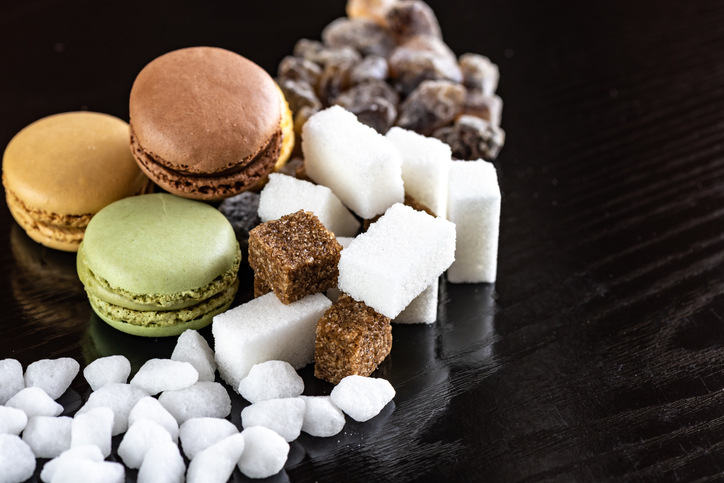Is Sugar Fuelling Your Weight Gain?
It’s a rare woman who doesn’t have a sweet tooth, but although you may think your sugar consumption is low this may make you think again.

Sugar is rarely out of the news, and an excess of it is linked to a number of health conditions, including diabetes, and of course weight gain.
How sugar can become addictive
Some signs you may not have an entirely healthy relationship with sugar are that you crave it, lose control of your emotions, and eat more than you planned.
Sugar fuels every cell in the brain. Your brain also sees sugar as a reward, which makes you keep wanting more of it. If you often eat a lot of sugar, you’re reinforcing that reward, which can make it tough to break the habit.
Why we seek it
Why do you get a rush when you eat a sweet snack? The sugar in it – called a simple carbohydrate – is quickly turned into glucose in your bloodstream. Your blood sugar levels then spike and that is not good for you.
Simple carbs are also found in fruit, vegetables and dairy products. But these have fibre and protein that slow the process. Syrup, soft drinks, sweets, and any sugar added to drinks or foods don’t.
Why we shouldn’t
Your body needs to move glucose out of the bloodstream and into your cells for energy. To do this, your pancreas makes insulin, a hormone. As a result, your blood sugar level may have a sudden drop.
This rapid change in blood sugar leaves you feeling wiped out and shaky and searching for more sweets to regain that sugar “high.” So that midday sugary treat has set you up for more bad eating.
Not all sugar is obvious
Think you don’t have a sweet tooth, but crave bagels, crisps, or french fries? These starchy foods are complex carbs that the body breaks down into simple sugars. Eaten without better foods, starches can make blood sugar surge and crash like sugar.
White rice and white flour do this. Highly refined starches like white bread, crackers, and pasta are worst.
How to safely quit
Can you beat your sugar habit by quitting cold turkey? Some sugar detox plans urge you to avoid all sweets. That means all fruit, dairy, and refined grains. The idea is to purge your system of sugar.
Diet changes like this are too drastic to keep up. Changes that you can do only for the short term mean you’ll fall back to your old habits.
You don’t need sugar as much as you think you do. In fact, you can train your taste buds to enjoy things that aren’t as sweet. Try cutting out one sweet food from your diet each week.
For example, pass on dessert after dinner. Start putting less sugar in your coffee or cereal. Over time, you will lose your need for that sugar taste.
Speaking personally I always used to have sugar in coffee, and I gave up by slowly reducing the amount. After 6 months I was just dipping the end of the teaspoon into the sugar and you could have counted the grains!
I stopped and now if I accidentally get a drink with sugar in, I can’t’ drink it. Took 6 months but it was worth it.
Your action plan
If you make small, simple changes to your diet, it’s easy to keep them up.
– Start by eating more fruit and vegetables.
– Drink extra water.
– Check food labels, and pick those that don’t have a lot of sugar.
– Cut out a little bit of sugar each week. After a few weeks, you’ll be surprised at how little you miss it.
The power of protein
Eating protein is an easy way to curb sugar cravings. High-protein foods digest more slowly, keeping you feeling full for longer.
Protein doesn’t make your blood sugar spike the way refined carbs and sugars do. Pick proteins like lean chicken, low-fat yoghurt, eggs, nuts, or beans.
Fill up on fibre
Fibre helps fight a sugar itch in many ways. First, it keeps you full. High-fibre foods also give you more energy. Because they don’t raise your blood sugar, there’s no hungry crash after.
Choose fruit, vegetables, and whole grains. Or try adding some peanut butter on apple slices for a good protein/fibre combination.
Get moving
Exercise can help wipe out those sugar cravings and change the way you eat in general. You start to feel better and want healthier foods.
Do what you like, and will happily maintain, such as walking, riding a bike, dancing or swimming. Start out slow, and work toward at least 30 minutes at a time, 5 days a week.
Limit the ‘Healthy’ sugars, too
Honey, brown sugar, and other ‘syrup’ alternatives may sound healthy. But sugar is sugar. Whether it comes from bees or sugar cane, it can cause your blood sugar to rise.
Honey and unrefined sugars are slightly higher in nutrients, but their calories still count and, although they may help as you cut down on refined sugar as a temporary substitute, they still won’t help you lose weight.
Artificial sweeteners – yes or no?
Some studies suggest artificial sweeteners may leave you craving more sugar. That could make it harder to control your weight. The problem is, some experts say, that artificial sweeteners don’t help you break your taste for sweets.
Generally there are more negatives associated with artificial sweeteners and although psychologically you may think they are helping, the reality is they can actually make you crave even more sugar.
How much is too much?
If you’re like most people you eat 19 teaspoons or more of added sugar a day whether from food, drinks or sugar/sugar substitutes.
That adds up to 285 calories, which health experts say is far too much.
How much sugar should you be eating? According to the American Heart Association, no more than 6 teaspoons daily for women, and that’s still about 100 calories.
Is it sugar or not?
You don’t always see the word “sugar” on a food label, so it pays to know what else to look for. It sometimes goes by another name, like these:
* Agave nectar
* Brown rice syrup
* High-fructose corn syrup
* Dextrose
* Evaporated cane juice
* Glucose
* Lactose
* Malt syrup
* Molasses
* Sucrose
Watch out for items that list any form of sugar in the first few ingredients, or have more than 4 total grams of sugar.
Sugar can hide in foods where you least expect it. Although they don’t seem sweet, ketchup, barbecue and pasta sauces can have loads of sugar.
So can reduced-fat salad dressings, bread, baked beans, and some flavoured coffees.
Sugar and diabetes
Sugar itself doesn’t cause diabetes. But lots of sugar splurges can point you there and so can be considered a risk factor.
Too much of anything, including sugar, can pack on the pounds and the more weight you carry then your body may have a harder time using insulin, the hormone that controls blood sugar. When your body resists insulin, blood sugar and your risk of diabetes go up.
Helpful information
Weight gain at menopause is common and often related to hormone imbalance and oestrogen dominance.
Once your body has ceased hormone production from the ovaries it continues to produce oestrogen from the fat cells of the abdomen, belly and thighs. Bloating and belly fat can be a direct result of unbalanced oestrogen so balance that with progesterone.
This is the hormone that can help you lose weight as it acts as a natural diuretic as can a specific Weight Control Capsules used alongside Serenity, WEllsprings bioidentical progesterone cream.
This article can also help if ‘treats’ are sabotaging your diet efforts.
https://anna.blog.wellsprings-health.com/summer-solutions-for-controlling-weight-gain/



















